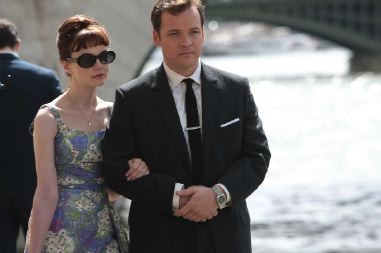An Education

Set in early 1960s London, An Education is a coming-of-age film about a sharp-witted teenager who falls in love with a man in his thirties. The world he unveils for her is glamorous, cultivated and illicit. It represents an education, but one very different from the Oxford education she had been striving for.
The picture, adapted by novelist Nick Hornby from Lynn Barber’s memoir and directed by Danish filmmaker Lone Scherfig, highlights the constraints of middle-class English life before the Beatles broke it apart. Jenny (Carey Mulligan) quibbles with her father, Jack (Alfred Molina), who believes that the only worthwhile activities are those that will help her get into Oxford. It’s useful to play cello in the youth orchestra, but not to attend concerts or play Juliette Greco records for pleasure—she could be shoring up her Latin grades. But Jenny doesn’t actually rebel until she meets the charismatic David (Peter Sarsgaard), who invites her to join him and his glittering friends Danny (Dominic Cooper) and Helen (Rosamund Pike) at a concert—and charms her parents into giving permission.
David and his companions represent a world that Jenny suddenly feels she’s being denied: a world of weekend car trips, fine restaurants and champagne. Her initial discomfort on learning that David and Danny are involved in shady business dealings and sometimes steal objets d’art quickly morphs into a kind of excitement. David becomes her lover, then her fiancé—with the blessing of her father, who sees in him a rich, pampering husband who would give Jenny a future that rivals that of an Oxford education. Meanwhile, Jenny’s headmistress (Emma Thompson) and English teacher (Olivia Williams) urge her to pursue her scholarly talents.
Sarsgaard gives a remarkable performance as a childlike sociopath, while Molina makes sublime satire out of Jack’s homebody orneriness and patriarchal persistence. The entire supporting cast is superb, especially Pike as a vapid, ornamental 20-something and Matthew Beard as a hapless young violinist who can’t meet Jack’s standards.
As for Mulligan, she’s a charming heroine; her snub-nosed elegance seizes the camera. But like Hornby’s screenplay, her character is too pat. Jenny takes every step away from her middle-class upbringing with perfect confidence, even approaching the loss of her virginity without the smallest qualm or quaver. We never see her feeling frightened about the cliffs that David urges her to leap from.
Scherfig and Hornby sketch in the period atmosphere with subtle skill, making us understand how few options women had and why an adolescent might prefer to imagine herself as an Audrey Hepburn character rather than as an English teacher (though Williams’s delicately reserved performance reveals the satisfactions of that life as well as its limitations).
But Jenny’s parents’ acquiescence when David unmasks himself as her suitor is bizarre. Jack later apologizes to Jenny for his earlier shortsightedness with a speech about the terrors instilled in him by his own deprived childhood, but this doesn’t explain his overnight metamorphosis from a cheerleader for Oxford to a beaming father of the bride.
The period details are convincing, and perhaps Barber’s story happened the way Hornby dramatizes it, but the movie still feels false.




